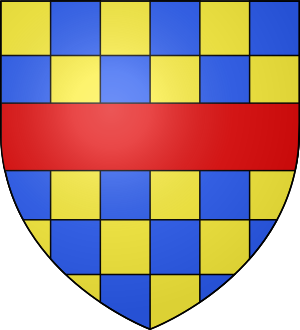Roger Clifford, 2nd Baron Clifford facts for kids
Roger de Clifford, 2nd Baron de Clifford (born January 21, 1300 – died March 23, 1322) was an important young nobleman in England. He was also known as the 2nd Lord of Skipton. Roger belonged to the powerful Clifford family, who owned Skipton from 1310 to 1676. He became a baron when his father, Robert de Clifford, 1st Baron de Clifford, passed away in 1314. His father died during a famous battle called the Battle of Bannockburn. Roger's mother was Maud de Clare. She was the oldest daughter of Thomas de Clare, Lord of Thomond. Roger also held the special role of High Sheriff of Westmorland, which was a position passed down in his family.
Contents
Roger Clifford's Life
Roger de Clifford lived during a time when England was ruled by King Edward II. It was a period of many changes and conflicts. Roger inherited his important titles when he was still quite young.
A Young Nobleman's Role
As the 2nd Baron de Clifford, Roger was a significant figure in northern England. His family controlled Skipton Castle, a very important stronghold. This meant he had a lot of power and responsibility in his region. He was expected to support the King, but also to look after his own lands and people.
Joining a Rebellion
Roger de Clifford became involved in a serious disagreement with King Edward II. This was because the King had a favorite advisor named Hugh Despenser the Younger. Many nobles, including Roger, felt that Despenser had too much power and was using it unfairly.
The Conflict Begins
Roger joined other powerful lords who decided to rebel against the King and Despenser. This was a very risky decision. He took part in a fight known as the Siege of Tickhill. This was one of the early events in the rebellion.
The Battle of Boroughbridge
The King's forces eventually met the rebels in a major battle. This happened at Boroughbridge in March 1322. During this battle, Roger Clifford was badly hurt. The rebel forces were defeated, and Roger was forced to give up.
Roger's Fate
After the battle, Roger was captured. He was taken to York and sentenced to death. He was executed there, likely on March 23, 1322. Because he rebelled against the King, all of his lands and titles were taken away. This included his family home, Skipton Castle.
Restoration of Lands
However, a few years later, in 1327, Roger's younger brother, Robert Clifford, 3rd Lord of Skipton, had the family's lands and titles given back to him. This shows how quickly power could change hands in medieval times.
 | Audre Lorde |
 | John Berry Meachum |
 | Ferdinand Lee Barnett |


